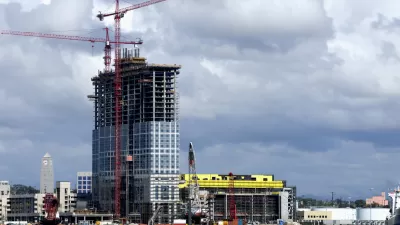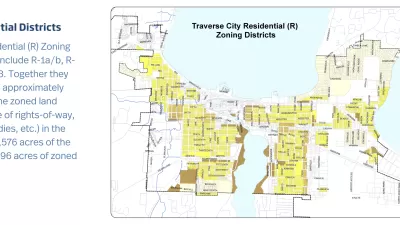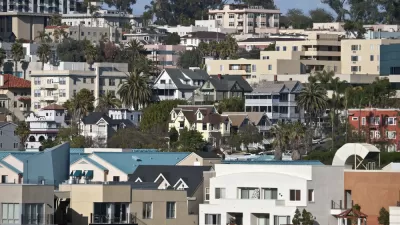A recent package of code changes by the city of San Diego will make it possible to build high-rise residential buildings and accessory dwelling units in larger areas around public transit.

The city of San Diego recently approved an ordinance that will allow high-rise apartment buildings and accessory dwelling units in a larger portion of the city by expanding the boundaries of zoning for transit oriented development from a half-mile to a mile radius around transit stations. Specifically, the expanded zoning districts will allow high-rise apartment buildings and accessory dwelling units on more parcels in the city.
David Garrick last week broke the news of the ordinance’s approval for the San Diego Union-Tribune and Globe St. also picked up the news this week. Planetizen shared news of the ordinance in January, before it went up for approval by the San Diego City Council.
Garrick’s article provides more insight into the debate that preceded the 5-4 vote that approved the ordinance. Opponents on the City Council argued that one-mile is too far to walk, and the ordinance would create congestion due to the additional car trips created by new residential density. Proponents argues that the zoning change would create opportunities for more housing affordable at low- and middle-incomes.
As noted by Garrick, the zoning changes discussed here were included in a package of 84 total municipal code changes. “The other changes include outlawing storage facilities in prime industrial areas, expanding where tasting rooms are allowed and making downtown more family-friendly with new incentives for three-bedroom apartments and child care businesses,” and “Additional changes approved Tuesday as part of the annual code update include tougher rules for new projects vulnerable to sea-level rise and stronger wildfire prevention rules for climate-friendly energy storage facilities.”
Garrick’s article, linked below, suggests that the zoning change came about as a response to pressure from state housing regulators during the Regional Housing Needs Assessment process, which has been upending planning the state of California for the past year, and will continue to do so for the foreseeable future.
FULL STORY: Badly needed homes, or ‘infill sprawl?’ City approves controversial plan for high-rises farther from transit

Trump Administration Could Effectively End Housing Voucher Program
Federal officials are eyeing major cuts to the Section 8 program that helps millions of low-income households pay rent.

Planetizen Federal Action Tracker
A weekly monitor of how Trump’s orders and actions are impacting planners and planning in America.

Ken Jennings Launches Transit Web Series
The Jeopardy champ wants you to ride public transit.

Rebuilding Smarter: How LA County Is Guiding Fire-Ravaged Communities Toward Resilience
Los Angeles County is leading a coordinated effort to help fire-impacted communities rebuild with resilience by providing recovery resources, promoting fire-wise design, and aligning reconstruction with broader sustainability and climate goals.

When Borders Blur: Regional Collaboration in Action
As regional challenges outgrow city boundaries, “When Borders Blur” explores how cross-jurisdictional collaboration can drive smarter, more resilient urban planning, sharing real-world lessons from thriving partnerships across North America.

Philadelphia Is Expanding its Network of Roundabouts
Roundabouts are widely shown to decrease traffic speed, reduce congestion, and improve efficiency.
Urban Design for Planners 1: Software Tools
This six-course series explores essential urban design concepts using open source software and equips planners with the tools they need to participate fully in the urban design process.
Planning for Universal Design
Learn the tools for implementing Universal Design in planning regulations.
Ada County Highway District
Clanton & Associates, Inc.
Jessamine County Fiscal Court
Institute for Housing and Urban Development Studies (IHS)
City of Grandview
Harvard GSD Executive Education
Toledo-Lucas County Plan Commissions
Salt Lake City
NYU Wagner Graduate School of Public Service





























